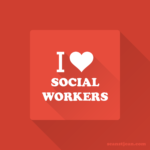We’ve come to the end of my series on reducing your sense of overwhelm and stress at work and I have saved the best for last. I debated sharing this one action that, if taken, will lower your helping professional stress-load more than anything else. I know that your job is crazy. I know that some days you feel like trading your briefcase in and selling hot dogs on a street corner. But I’m warning you that the final action step I’m about to talk about slays a pretty big sacred cow and I expect to get some unkind emails about it. However before I share what it is, let’s recap what we’ve learned over the past five posts (if you want to just get on with it, by all means scroll down).
In the first post of this series (which can be found here), I argued that the notion of ‘work-life’ balance is only a myth that causes us a good deal of grief. I suggested that we can only do one thing at a time and that we get into trouble when we try to multitask. Feelings of overwhelm (leading to procrastination, compulsions, and feelings of hopelessness) often follow when we unsuccessfully try to achieve the imaginary state of “balance”.
I then promised to offer five solid actions, that if taken, would guarantee your feelings of overwhelm would diminish and be replaced by greater productivity and a heightened sense of subjective well-being. That’s a big promise! But I’m just curious- have you tried any of them yet? After all, knowledge adds little if one does not learn to execute. It’s like reading diet book after diet book, expecting that simply pouring over those pages will melt the pounds away. Okay, I’ll get off your back for now… Let’s recap what we’ve covered:
Action Step 1: Get it all out of your head and down on paper. You can find that post here. Write down every little job, idea, appointment, grocery item, emotion, wish, project, and “to-do” item that has been clogging up your precious noggin. After everything is down (it may be hundreds of items!) develop a master action list. Also, if you are an “idea” person, I would recommend keeping a journal close by for you to store all of those brilliant (and often distracting) thoughts. Once you have a prioritized list, start knocking them off one by one.
Action Step 2: Park passion and pursue performance. That post is here. This is primarily a mind-shift, but it leads to a completely different set of actions. When we release the self-focused idea that we should be “living our dreams” or “following our bliss” and instead adopt a mentality that is focused on enhancing our productive powers in the service of others, the result is a calm but powerful impact on the world. True bliss follows from this.
Case in point: when I started a new position years back (even though it was a clinical counselling job that I had been dreaming about having for more than a decade) I quickly became dissatisfied. I started searching the online job ads EVERY DAY for a year and a half. I became obsessed with finding the actual job that would satisfy my every desire. What if instead of that, I invested those 15-20 daily minutes into finishing my Ph.D., or into a weight training routine, or writing love letters to my wife, or in prayer and meditation? What could have been different in my life if I had spent those 182 hours (or 5 weeks of full-time work) producing value instead of fruitlessly longing for something else? If you’re looking for a specific actionable step, try this: write down one thing you want to get really good at while at your present job. Create a list of the steps you would need to take over the next 6-12 months (including what resources to tap, who you can ask to mentor you, etc.) to make this happen.
Action Step 3- Systematize your work-life. Find it here. For a busy professional, systems are salvation. We require systems that allow us to free up our mental and emotional space for other things. Setting up your working life in a deliberate way is a bit of up front labour, I won’t lie. However, the more you learn to rely on habits and routines (aka: autopilot) instead of willpower to get your work done, the less of an emotional and psychological toll your work will exact on you. There are many work hacks specific to the helping professions that will save you a good deal of grief.
Action Step 4- Build good boundaries. That post is here. I would say that about 2% of people went into the helping professions because they wanted to make money or enjoy fame and prestige, or because it’s “just a job to pay the bills”. If I wanted a job that was solely about income I would have become an investment banker (sorry, investment bankers!). No, we got into the field because of a flame inside of us, large or small, that was stoked whenever we offered help to another human being. I would suspect that many of us (especially those of us in child protection or other “hardcore” helping jobs) also wanted to do something that mattered. We wanted to stand in the gap and make a difference.
The trouble is that what fuels that passion can also be recipe for poor boundaries. In turn, poor boundaries burn us out with a capital “B”. The number one issue I see is when social workers, counsellors, etc., start taking responsibility for items that belong solely to their clients. If you struggle with boundaries, I recommend sitting down and thinking about what you are and are not responsible for in your present position, and then vigorously defend your line.
Okay now that we’ve reviewed, let’s ready the sacred cow!
As I mentioned above, I would reckon that you are defined by your big heart. You are willing to crawl into the trenches and get dirty for your clients. It just seems like the right thing to do. Remember, we are talking about reducing feelings of overwhelm. Reducing burnout. Keeping you in the game. World War I was a war of attrition and the men who fought overseas experienced real physical trenches. Many of those who survived came home shell-shocked; they were forever changed. Many knew they would die in those trenches and were prepared to pay that price. What most didn’t know, however, was that if they survived, their lives would never be the same. Simply being in the trench harmed them, even if they never took a bullet. Why? Because they watched their friends take bullets for them. And for every one terrifying thing they watched with their own eyes on the battlefield, they heard the stories of ten or twenty more they didn’t see.
Now, how do I say this? How do I convey this concept without sounding cold-hearted or cynical? Allow me to just come out and say it. If you want to survive in a helping field like social work, there is one thing you need to do- one thing that will protect you:
You have to stop caring with your emotions. You must remove your emotional presence from the horrific things you hear about.
I know that this is a tricky concept, so let me try to explain myself.
I am not saying you shouldn’t care, period. What I am saying is that you have to learn to care in a way that is sustainable.
Let’s look at this logically. Think about cognitive-behavioural therapy. We know that it isn’t the thing that happened that makes us upset- it’s the way we think about the thing that happened. We know that sometimes people have misbeliefs that cause them to experience unnecessary grief. We all know that if we ruminate on catastrophic thoughts (like maybe my husband will die or maybe my child will be kidnapped or maybe I will be diagnosed with terminal cancer) that our mental and emotional state can take a nose dive pretty quick. And that’s all imaginary!
Or perhaps we hear that our brother fell off the roof and broke his leg or that our daughter is getting a divorce. Even though these things aren’t happening directly to us, we are devastated because of the strong bonds we have. We naturally take on their emotions and grieve with them. This is totally normal and makes us human.
Yet helping professionals step into those traumatic stories all the time, all day long. If you are like most of your big-hearted peers, it means that you will be naturally inclined to stand closely with your clients. You’re compelled to deeply empathize with them and support them; to feel what they are feeling as though they were your family.
What makes this a problem is that the human heart can only withstand so much of this before it begins to truly suffer- this is what some have called vicarious trauma and secondary traumatic stress. I have argued in the past that experiencing this trauma puts us on the road to burnout quickly. That’s why the average lifespan of a child protection worker is only 14 months.
So when I say, “stop caring with your emotions” I mean just that. You may already notice that most seasoned older workers do this anyway. They say and do the right things and are very professional. They communicate authentic empathy to clients. Yet upon further examination you may observe a certain subtle detachment about them. If you watch closely, you can see that things don’t land very hard on them. They don’t think about their young client who was sexually assaulted when they go home at night. In fact, they rarely dwell on those things. Yes, they meet his needs at work. They act with compassion and understanding. But they disavow the weight of what has occurred.
You may be asking, “Ok, Mr. Smart Guy, just how am I supposed to do that? Turn off my heart? Not care? Yeah right!” I want you to know that I hear you and I don’t have any easy answers or turnkey solutions. What I can say is this: in high-trauma professions like social work, this dynamic takes out more good people than anything else. The really scary part? If you do acquire full-blown secondary traumatic stress, the recovery rate is only 50%. Those aren’t good odds.
I promise to go into much more detail about the steps you can take to protect yourself from vicarious trauma and secondary traumatic stress in future posts. But for now, think about how counsellors extinguished phobias in clients- through graduated exposure therapy. When you get thrown into a scary job, there’s nothing gradual about it- just a lot of exposure! Eventually, however, as you learn that you are personally safe from harm and that your extreme emotions are not needed, those heavy feelings begin to subside.
Think about becoming a skydiving instructor versus skydiving the first time. The very first time you jump out of a plane, what are you thinking? “I am going to die!!” Why would you think that? Because you should die! Jumping out of planes is not normal. Yet after many, many jumps, the fear disappears. Why? Because in spite of your actions, you remain unharmed over time. Your brain knows this and therefore doesn’t need to flood itself with fight or flight hormones. By the time you’re teaching others to jump out of planes it’s an emotional piece of cake.
Eventually, you will be able to think and talk professionally about the horrific things you see and hear without carrying the emotional weight of those things. That is the nature of disavowal. It’s like any other icky job you can’t avoid doing like changing dirty diapers or taking out the compost bucket. You learn to dissociate from the disgust of it, while still getting the job done.
One final caveat. This is not the same as what can happen to those who have undergone extreme trauma. Victor Frankl described the experience of people completely shutting down emotionally while in concentration camps after undergoing unspeakable suffering. In that case, their entire emotional centers collapsed in an attempt to cope with their extreme condition. This is something qualitatively different. In our case we are talking about ways that we can preserve our hearts while at work so that we can be emotionally available for our friends and family when we get home.
When you learn this vital skill, you will be better protected from the scourge of repetitive stress injuries- not of your hands or legs, but of your heart. And the state of your heart is all that matters to me.
That’s the end of this series, but stay tuned- there’s more to come.
Wishing you all the best.
 Last month I promised to address each of the five “secret” factors that take child protection workers out at the knees. You can go ahead and read that here. I call them “secret” reasons because they’re either not obvious to the public or because they represent beliefs that we covertly cling to.
Last month I promised to address each of the five “secret” factors that take child protection workers out at the knees. You can go ahead and read that here. I call them “secret” reasons because they’re either not obvious to the public or because they represent beliefs that we covertly cling to. I love social workers. I love their heart for the work. I love their drive and energy. I love how they take responsibility for problems they didn’t create. Social workers are awesome. Yet according to the stats, the average life expectancy of a child protection social worker is only 14 months.
I love social workers. I love their heart for the work. I love their drive and energy. I love how they take responsibility for problems they didn’t create. Social workers are awesome. Yet according to the stats, the average life expectancy of a child protection social worker is only 14 months. Think about a scoop of ice cream sitting in a cold dish with hot chocolate fudge oozing down the sides. Can you taste it? You may be salivating already. Imagine that you are hiking at the grand canyon and that you are cautiously stepping toward the edge. You can see straight down to the river valley 4000 feet below. Did your feet start to tingle? Your rational mind knows that you are at your desk or on your phone sitting in your car, but your body doesn’t know that! It’s already preparing to hold onto some little tree should you spill over the edge.
Think about a scoop of ice cream sitting in a cold dish with hot chocolate fudge oozing down the sides. Can you taste it? You may be salivating already. Imagine that you are hiking at the grand canyon and that you are cautiously stepping toward the edge. You can see straight down to the river valley 4000 feet below. Did your feet start to tingle? Your rational mind knows that you are at your desk or on your phone sitting in your car, but your body doesn’t know that! It’s already preparing to hold onto some little tree should you spill over the edge. Trouble ensues when we know that the story is
Trouble ensues when we know that the story is 